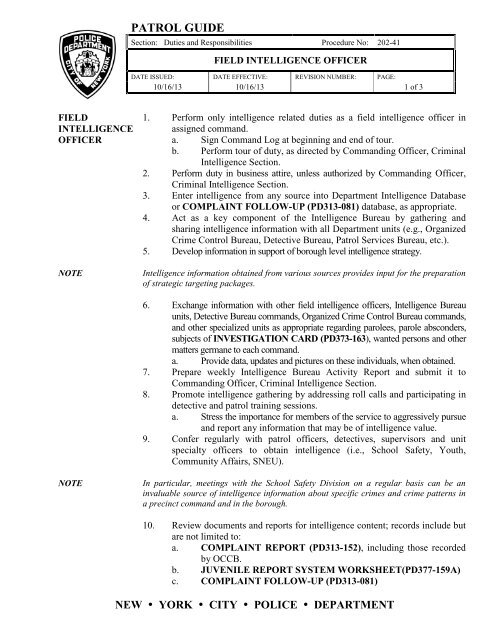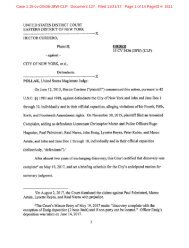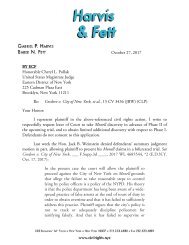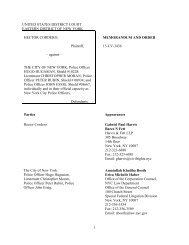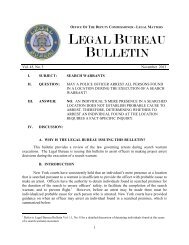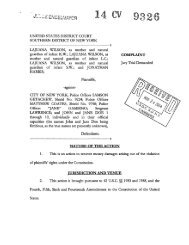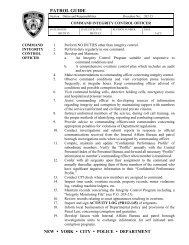PATROL GUIDE
Create successful ePaper yourself
Turn your PDF publications into a flip-book with our unique Google optimized e-Paper software.
<strong>PATROL</strong> <strong>GUIDE</strong><br />
Section: Duties and Responsibilities Procedure No: 202-41<br />
FIELD INTELLIGENCE OFFICER<br />
DATE ISSUED: DATE EFFECTIVE: REVISION NUMBER: PAGE:<br />
10/16/13 10/16/13 1 of 3<br />
FIELD<br />
INTELLIGENCE<br />
OFFICER<br />
NOTE<br />
1. Perform only intelligence related duties as a field intelligence officer in<br />
assigned command.<br />
a. Sign Command Log at beginning and end of tour.<br />
b. Perform tour of duty, as directed by Commanding Officer, Criminal<br />
Intelligence Section.<br />
2. Perform duty in business attire, unless authorized by Commanding Officer,<br />
Criminal Intelligence Section.<br />
3. Enter intelligence from any source into Department Intelligence Database<br />
or COMPLAINT FOLLOW-UP (PD313-081) database, as appropriate.<br />
4. Act as a key component of the Intelligence Bureau by gathering and<br />
sharing intelligence information with all Department units (e.g., Organized<br />
Crime Control Bureau, Detective Bureau, Patrol Services Bureau, etc.).<br />
5. Develop information in support of borough level intelligence strategy.<br />
Intelligence information obtained from various sources provides input for the preparation<br />
of strategic targeting packages.<br />
6. Exchange information with other field intelligence officers, Intelligence Bureau<br />
units, Detective Bureau commands, Organized Crime Control Bureau commands,<br />
and other specialized units as appropriate regarding parolees, parole absconders,<br />
subjects of INVESTIGATION CARD (PD373-163), wanted persons and other<br />
matters germane to each command.<br />
a. Provide data, updates and pictures on these individuals, when obtained.<br />
7. Prepare weekly Intelligence Bureau Activity Report and submit it to<br />
Commanding Officer, Criminal Intelligence Section.<br />
8. Promote intelligence gathering by addressing roll calls and participating in<br />
detective and patrol training sessions.<br />
a. Stress the importance for members of the service to aggressively pursue<br />
and report any information that may be of intelligence value.<br />
9. Confer regularly with patrol officers, detectives, supervisors and unit<br />
specialty officers to obtain intelligence (i.e., School Safety, Youth,<br />
Community Affairs, SNEU).<br />
NOTE<br />
In particular, meetings with the School Safety Division on a regular basis can be an<br />
invaluable source of intelligence information about specific crimes and crime patterns in<br />
a precinct command and in the borough.<br />
10. Review documents and reports for intelligence content; records include but<br />
are not limited to:<br />
a. COMPLAINT REPORT (PD313-152), including those recorded<br />
by OCCB.<br />
b. JUVENILE REPORT SYSTEM WORKSHEET(PD377-159A)<br />
c. COMPLAINT FOLLOW-UP (PD313-081)<br />
NEW • YORK • CITY • POLICE • DEPARTMENT
<strong>PATROL</strong> <strong>GUIDE</strong><br />
PROCEDURE NUMBER: DATE EFFECTIVE: REVISION NUMBER: PAGE:<br />
202-41 10/16/13 2 of 3<br />
FIELD<br />
INTELLIGENCE<br />
OFFICER<br />
(continued)<br />
NOTE<br />
NOTE<br />
d. ON-LINE BOOKING SYSTEM ARREST WORKSHEET (PD244-<br />
159)<br />
e. UNUSUAL OCCURRENCE REPORT (PD370-152)<br />
f. DETECTIVE BUREAU UNUSUAL OCCURRENCE REPORT<br />
(PD370-151)<br />
g. STOP, QUESTION AND FRISK REPORT WORKSHEET<br />
(PD344-151A)<br />
h. SCHOOL SAFETY DIVISION CRIMINAL INCIDENT<br />
REPORT (PD313-147)<br />
i. NYS Domestic Incident Report (DCJS 3221)<br />
j. Arrests and complaint statistics, patterns and trends.<br />
k. Intelligence Bureau reports and worksheets<br />
11. Confer regularly with command crime analysts.<br />
a. Communicate information from crime analysis center, when appropriate.<br />
12. Attend local community meetings and other forums to obtain information<br />
of intelligence value.<br />
Field intelligence officers in adjoining commands should confer with each other on a<br />
regular basis to share intelligence information.<br />
13. Access command computer databases for developing and verifying<br />
intelligence.<br />
14. Utilize Commanding Officer, Criminal Intelligence Section to access<br />
information from computer databases that are not available at command<br />
level.<br />
15. Document intelligence forwarded to investigative and enforcement units.<br />
a. Record follow-up action (i.e., investigation initiated, arrest effected,<br />
search warrant executed, etc.)<br />
The field intelligence officer will notify Commanding Officer, Criminal Intelligence<br />
Section prior to the execution of a search warrant, if possible, and will represent the<br />
Intelligence Bureau at the scene. Confidentiality will be maintained in order to ensure the<br />
safety of all members involved and the integrity of the investigation.<br />
16. Utilize the secure e-mail system when practical for making notifications<br />
and inquiries to other field intelligence officers, and Intelligence Bureau.<br />
17. Advise and make recommendations to commanding officer, detective<br />
squad commander and precinct narcotics module supervisor on intelligence<br />
matters.<br />
18. Assist with registering confidential informants, and obtaining search<br />
warrants.<br />
19. Participate in command supervisory and crime strategy meetings.<br />
20. Conduct secondary debriefings of prisoners when circumstances indicate<br />
intelligence may be gained.<br />
a. Coordinate debriefings with Detective Bureau and OCCB personnel<br />
as appropriate.<br />
NEW • YORK • CITY • POLICE • DEPARTMENT
<strong>PATROL</strong> <strong>GUIDE</strong><br />
PROCEDURE NUMBER: DATE EFFECTIVE: REVISION NUMBER: PAGE:<br />
202-41 10/16/13 3 of 3<br />
FIELD<br />
INTELLIGENCE<br />
OFFICER<br />
(continued)<br />
ADDITIONAL<br />
DATA<br />
FORMS AND<br />
REPORTS<br />
21. Develop command-specific debriefing questions in regard to specific<br />
crimes, crime patterns or trends.<br />
22. Provide command-specific questions to other Intelligence Bureau units,<br />
as appropriate, for their debriefings.<br />
23. Maintain a record of debriefings conducted that includes details on positive<br />
debriefings.<br />
24. Respond to major incidents in the field to provide assistance and gather<br />
timely information.<br />
a. Identify self to ranking patrol commander and investigator.<br />
b. Prepare COMPLAINT FOLLOW–UP and forward copy to<br />
Commanding Officer, Criminal Intelligence Section.<br />
25. Be present during the debriefing of SNEU arrests and all other arrests,<br />
when possible, to assist in the development of information regarding drug<br />
trafficking and any other crimes.<br />
26. Notify the Intelligence Bureau, Criminal Intelligence Section regarding all<br />
unusual incidents and significant occurrences.<br />
The position of field intelligence officer may be assigned to a uniformed member of the<br />
service in the rank of sergeant, detective, or police officer.<br />
INVESTIGATION CARD (PD373-163)<br />
COMPLAINT REPORT (PD313-152)<br />
JUVENILE REPORT SYSTEM WORKSHEET (PD377-159A)<br />
COMPLAINT FOLLOW-UP (PD313-152)<br />
ON-LINE BOOKING SYSTEM ARREST WORKSHEET (PD244-159)<br />
UNUSUAL OCCURRENCE REPORT (PD370-152)<br />
DETECTIVE BUREAU UNUSUAL OCCURRENCE REPORT (PD370-151)<br />
STOP, QUESTION AND FRISK REPORT WORKSHEET (PD344-151A)<br />
SCHOOL SAFETY DIVISION CRIMINAL INCIDENT REPORT (PD313-147)<br />
NYS Domestic Incident Report (DCJS 3221)<br />
NEW • YORK • CITY • POLICE • DEPARTMENT


